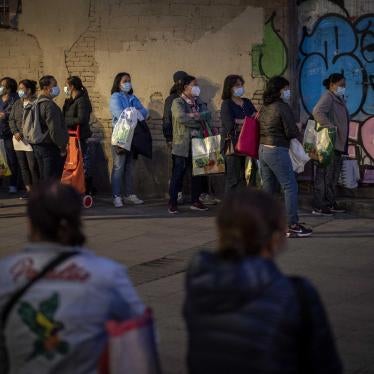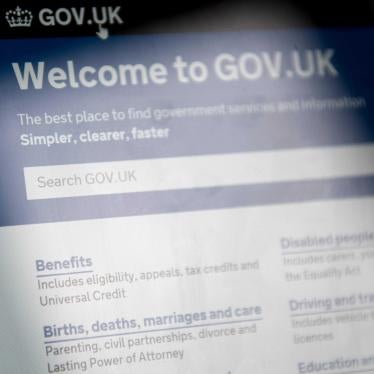(Washington, DC) – The World Bank should urge the Turkmen government to make a commitment to governance reforms before it moves to normalize relations with Turkmenistan, Human Rights Watch and Crude Accountability said today. The bank’s board of directors is scheduled to consider a reengagement strategy for Turkmenistan on July 25, 2013.
Turkmenistan is one of the most closed and repressive countries in the world, Human Rights Watch said. The World Bank has not had an active project there since 1997.
“This is the wrong kind of engagement at the wrong time,” said Jessica Evans, senior advocate for international financial institutions at Human Rights Watch. “Working with the government of Turkmenistan on a first project that is not about improving basic governance would suggest that it’s time to lift the Turkmen government from its pariah status. But that time has not come.”
Turkmenistan’s recent economic gains have not translated into equitable benefits to the population. Despite Turkmenistan’s vast oil and gas wealth, poverty persists. According to the United Nations Development Program’s human development indicators, Turkmenistan has the lowest life expectancy at birth in the region, at 65, and this rate has remained stagnant since 2006. Turkmenistan also has the second highest mortality rate under age 5 in the region, at 45 per 1,000 live births.
In 2012, the World Bank reengaged with Burma following government promises of reforms. Yet with Turkmenistan, the bank is working to reengage with no sign of reforms on the horizon, said Human Rights Watch and Crude Accountability, which works with local activists in the region to ensure environmental and human rights for communities impacted by natural resource development.
In a September 2012 letter to the World Bank, Crude Accountability, Human Rights Watch, and the Open Society Foundations urged the World Bank to sequence any reengagement with Turkmenistan to support genuine, much-needed reform. The organizations encouraged the World Bank to support reforms that would enable people to participate in a meaningful way in designing their country’s development agenda, significantly enhance transparency and accountability for government finances, ensure that the government is making the country’s urgent social needs a priority, and address environmental health concerns.
In its strategy, the World Bank proposes to provide technical assistance to the government on macroeconomic management, private and financial sector development, and the environment. When responding to the letter from the three groups, a bank official said that “advisory support for economic diversification has the potential to contribute to improved employment prospects and living standards for Turkmen citizens, without posing significant risks.”
The European Bank for Reconstruction and Development (EBRD) has, since 2010, adopted a so-called calibrated strategic approach to Turkmenistan, considerably limiting its investments there because of the dire human rights situation and the lack of financial accountability.
The World Bank does not have an express mandate to consider the human rights situation in making investment decisions, but it has recognized that sustainable and inclusive development, the stated goal of its Turkmenistan strategy, requires not only good economic policies but strong institutions and good governance.
Human Rights Watch and Crude Accountability said that by forging ahead with new programming, the bank risks undermining international institutions that, like the European Bank, have pressed for benchmarks the Turkmen government must meet before benefitting from deeper engagement. Any new programming, in an initial period, should be strictly limited to enabling meaningful civic participation in public life, promoting transparency and accountability of government finances, and addressing urgent social needs and environmental health concerns, the two organizations said.
“It is difficult to see how the proposed project, without convincing indications that the government is committed to good governance, will lead to sustainable and inclusive development,” Evans said. “The Turkmen government has done nothing to indicate that it is remotely interested in meaningful reform.”
Turkmenistan is one of the most closed countries in the world, with no independent media, no freedom of speech or assembly, and virtually no access for international monitors, including those from the UN, to investigate the full extent of the government’s human rights violations. The government interferes with and controls residents’ right to leave and return to Turkmenistan through an informal and arbitrary system of travel bans commonly imposed on activists and perceived government rivals, their families, and relatives of exiled dissidents. Untold numbers of people languish in prison in Turkmenistan because the authorities continue to use imprisonment as a tool for political retaliation.
A group of Turkmen civil society activists who analyzed the bank’s interim strategy urged the bank to refrain from any cooperation with the Turkmen government until the government commits to and puts in place effective measures to fight corruption, promote transparency in the economy, ensure an independent judiciary, and end “politically and ideologically motivated projects.” The group also urged the bank to adopt a “calibrated approach” to Turkmenistan, which could be adjusted in response to demonstrated progress by the Turkmen government in public policy reform.
“The World Bank has increasingly recognized that public participation is essential for sustainable development,” Evans said. “But until the bank shows its commitment to public participation in development in complex contexts like Turkmenistan, such talk will ring hollow.”





